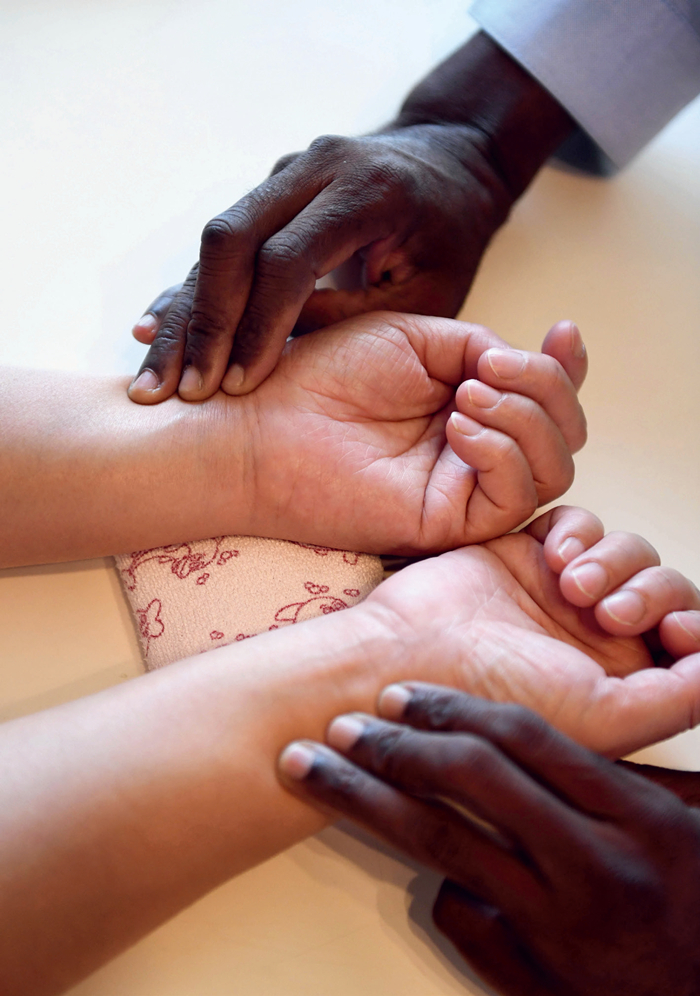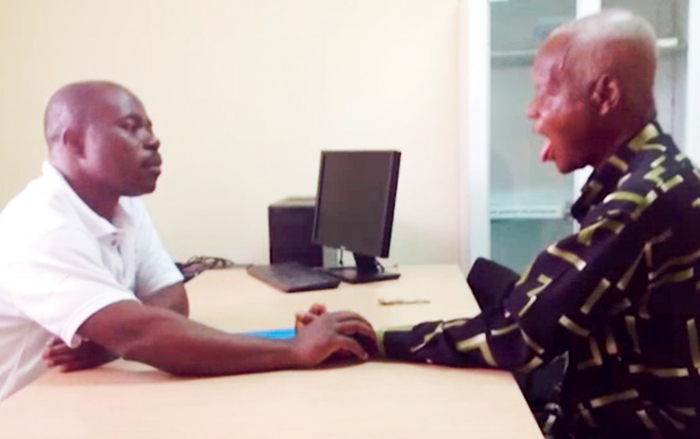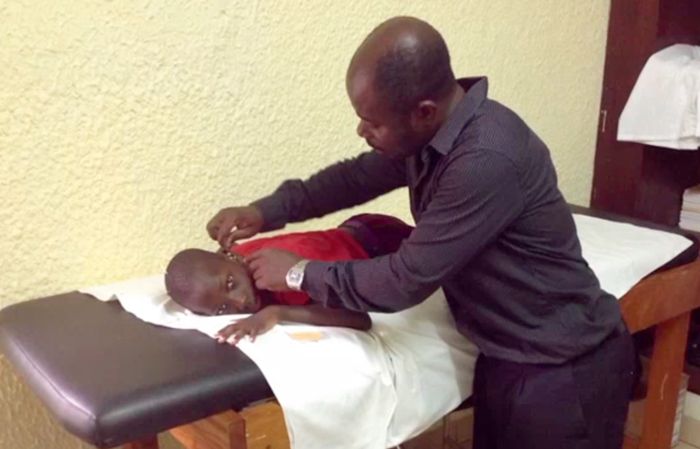|
||||||||||
| Home Nation World Business Opinion Lifestyle ChinAfrica Multimedia Columnists Documents Special Reports |
|
||||||||||
| Home Nation World Business Opinion Lifestyle ChinAfrica Multimedia Columnists Documents Special Reports |
| ChinAfrica |
| A Pioneering Practice |
| A Gabonese doctor’s dedication to TCM and his tireless efforts to bring it to Africa |
| By Li Xiaoyu VOL. 13 DECEMBER 2021 ·2021-12-17 |

“If I have an opportunity to improve Gabonese people’s health through TCM, I will like to help them live longer and healthier lives,” he said.
To achieve his goal, he pursued the study of TCM in China and became the first Gabonese to earn a doctorate in this field. He now hosts programs on TCM lifestyle and philosophy on social media, allowing all of Africa to benefit from the Chinese traditional medicine. He also owns a TCM clinic in Gabon, with a growing number of patients and trainees in the acupuncture department.
All this was unimaginable to him 20 years ago.

Ovono Nkomo wants to improve the life expectancy of Gabonese people through TCM (COURTESY)
An 180-degree turn
His first encounter with TCM was in 2001, when he visited China for the first time on a Chinese government scholarship to study Western medicine at the Shanghai Jiao Tong University School of Medicine. When he arrived, the first thing that surprised him was that he was served hot water when he asked for a drink. He was then informed that in China, hot water is consumed on most occasions. He was perplexed by this explanation. He later learned that, according to the theoretical foundations of TCM, hot water promotes the regulation of all organs and viscera in the body.
With several family members practicing Western medicine, becoming a doctor practicing Western medicine appeared to be the simplest path for him. However, a year before graduation, he made an unthinkable decision of specializing in TCM and promoting it among his compatriots. Indeed, while interning in the acupuncture department of Shanghai’s Ruijin Hospital in 2004, he was impressed by the virtues of TCM and the clinical outcomes that resulted from them.
“I had a strong intuition that these ancient practices could be applied and used in Africa. I considered TCM and traditional African medicine to be related,” Nkomo told ChinAfrica.
After graduating with a degree in Western medicine in 2005, he joined Nanjing TCM University, where he remained until receiving his doctorate in acupuncture and moxibustion in 2016. Over this long period, Nkomo accumulated a wealth of knowledge and experience in TCM, from the theory of the five elements and that of yin and yang balance of the body, to the art of healthy living and the use of therapeutic tools (acupuncture needle, cupping, guasha, moxa, etc.). He also practiced qigong, Taijiquan, tuina, and massage.
None of this was easy though. He had to learn Chinese language and culture, use ancient books written in classical Chinese, and deal with adverse weather conditions (harsh winters without heating in the lecture halls). But he remained upbeat in the face of difficulties.
“I just set myself goals similar to those of soldiers going to war,” he said. His only secret to overcoming all of these obstacles was to work tirelessly and to assimilate into Chinese culture, which he considers to be an inseparable part of TCM.

Ovono Nkomo applies TCM treatment at a clinic in a remote rural area in Gabon (COURTESY)
Unwavering dedication
Nkomo had the opportunity to attend the annual conference of the World Federation of Acupuncture-Moxibustion Societies in 2007 as an international student representative. He then embarked on a world tour, visiting more than 100 countries across four continents to promote TCM. Compared to Western medicine, TCM, he claims, is more affordable. “It has fewer side effects because it is entirely based on natural remedies,” he said. “It can be practiced even in the most remote parts of the world.”
Despite his command of seven languages (French, English, Spanish, German, Chinese, Portuguese, and Fang), he has found it difficult to explain the fundamentals of TCM, which treats the entire human body to restore its balance. “The hegu (a pressure point) on the hand is used to treat toothaches and headaches. Foreigners are perplexed by this because there is no concept of acupuncture points or meridians in their culture,” Nkomo said. Finally, he finds this experience to be very instructive because it allows him to learn about other medicines that are similar to TCM.
According to UNAIDS, Sub-Saharan Africa is one of the world’s most AIDS-affected regions. However, Western medicine is not effective in treating related lung infections, which can easily lead to drug resistance. In 2015, Nkomo conducted groundbreaking clinical research on the use of moxibustion in Gabon and Equatorial Guinea. This required him to travel regularly to Africa at his own expense and take care of the patients himself, most of whom were living in difficult financial conditions. His goal was to increase the number of CD4+T lymphocytes in the patients by using the acupuncture points dazhui (VB11) and zusanli (ST36) in combination with conventional therapy. Fortunately, his efforts paid off. There was a visible improvement in the patients’ white blood cells.
Nkomo returned to Gabon in 2020 to make TCM more accessible to Africans. Given the Gabonese Government’s particular emphasis on getting traditional medicine legally recognized as a complementary medicine to Western medicine, his efforts have proven to be fruitful. However, the sector’s future is still clouded by a scarcity of professionals. In fact, Africa is the only continent where the number of people trained in TCM is nearly zero, with the notable exception of South Africa. Neither of Gabon’s two TCM hospitals, established through Sino-Gabonese cooperation, has any locally trained TCM personnel. “Communication with the Chinese doctors sent to the hospitals is a major handicap for these facilities,” said Nkomo.
In response to this challenge, he plans to set up a TCM training facility at a university in his country in the near future. “Training, conferences and seminars conducted in local languages will be a major asset throughout the continent,” he hopes.
Comments to lixiaoyu@chinafrica.cn
| About Us | Contact Us | Advertise with Us | Subscribe |
| Copyright Beijing Review All rights reserved 京ICP备08005356号-5 京公网安备110102005860号 |